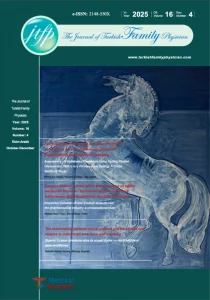Evaluation of Primary Health Care
Introduction: There is a fundamental change in primary health care system in our country. The objectives of the Health Transformation Program are to organize, finance and provide health services in an effective, efficient and equitable manner. Identifying the situation in primary care, which constitutes the most important part of health services, is extremely important in terms of determining the future health of the society. The aim of this study is to reveal the effects of changes in health services at the patient level.
Method: The Primary Care Assessment Scale (PCAS) was used in this cross-sectional analytical study.
Results: In this study, 390 house and 762 persons were reached. Of the participants, 50.8% (n = 387) were female, 49.2% (n = 375) were male, and the mean age was 42.09 ± 11.91. It was seen that 39.4% (n = 300) of the participants received regular health services and 72.3% (n = 217) of them received this service from their family physician who works in primary health care centers. The highest score was in the longitudinal continuity (70.96 ± 26.42) and preventive counseling and counseling (70.96 ± 26.42), while the lowest score was in the financial access (38.94 ± 18.76).
Conclusion: There has been a change in the provision of primary health care services in our country. In our study with PCAS; which is one of the instruments that will evaluate the results of the application, it was found that the percentage of permanent physicians in primary care and financial access points were found low. In order to generalize the results, more comprehensive and advanced studies using such tools are needed.
References
- OECD Sağlık Sistemleri İncelemeleri Türkiye 2008. https://sbu.saglik.gov.tr/ekutuphane/kitaplar/ oecdkitap.pdf adresinden 1 Aralık 2019 tarihinde erişilmiştir.
- WHO, Alma Ata Deklarasyonu [online]. https://www.who.int/publications/almaata_declaration_en.pdf adresinden 26 Aralık 2019 tarihinde erişilmiştir.
- Fişek NH. Türkiye’de Sağlık Hizmeti. “Halk Sağlığına Giriş” içinde. Ankara, Hacettepe Üniversitesi Dünya Sağlık Örgütü Hizmet Araştırma ve Araştırıcı Yetiştirme Merkezi Yayını No:2. 1983; 155-66.
- Safran DG, Kosinski M, Tarlov AR, Rogers WH et al. The Primary Care Assessment Survey: Tests of data quality and measurement performance. Medical Care 1998; 36 (5): 728-39.
- Lağarlı T, Eser E, Baydur H. Birinci Basamak Değerlendirme Ölçeğinin (Primary Care Assessment Tool) hizmetten yararlananlar için Türkçe erişkin sürümünün psikometrik özellikleri. Turk J Public Health 2014;12(3):162-77.
- Sağlık İstatistikleri Yıllığı 2017, Sağlık Bakanlığı, Ankara. https://dosyasb.saglik.gov.tr/Eklenti/31096, turkcesiydijiv1pdf.pdf?0 adresinden 1 Aralık 2019 tarihinde erişilmiştir.
- Beaglehole R, Epping-Jordan JA, Patel V, Chopra M et al. Improving the prevention and management of chronic disease in low-income and middle-income countries: a priority for primary health care. Lancet 2008; 372: 940–49.
- TUİK: Türkiye işsizlik oranı. https://biruni.tuik.gov.tr/medas/ ?kn=72&locale=tr adresinden 1 Aralık 2019 tarihinde erişilmiştir.
- Kringos DS, Boerma W, Zee J, Groenewegen P. Europe’s strong primary care systems are linked to better population health but also to higher health spending. Health Affairs 2013;32(4):686–94.
- Kringos D, Boerma W, Bourgueil Y, Cartier T, Dedeu T, Hasvold T et al. The strength of primary care in Europe: an international comparative study. British Journal of General Practice 2013; 63 (616): 742-50.
- Sağlıkta Dönüşüm Programı Değerlendirme Raporu. Aralık 2012. https://sbu.saglik.gov.tr/Ekutuphane/kitaplar/SDPturk.pdf adresinden 1 Aralık 2019 tarihimde erişilmiştir.



